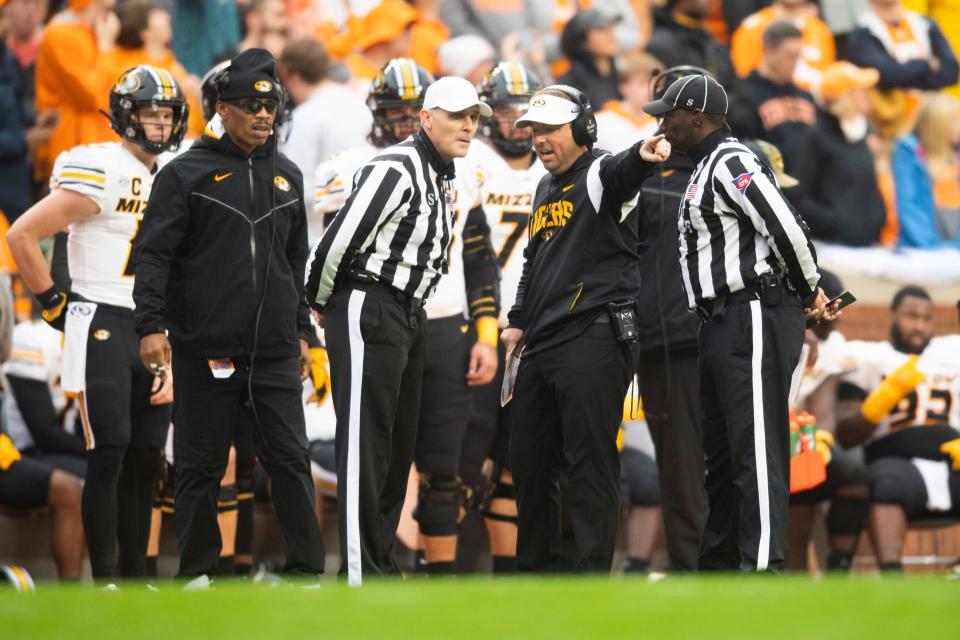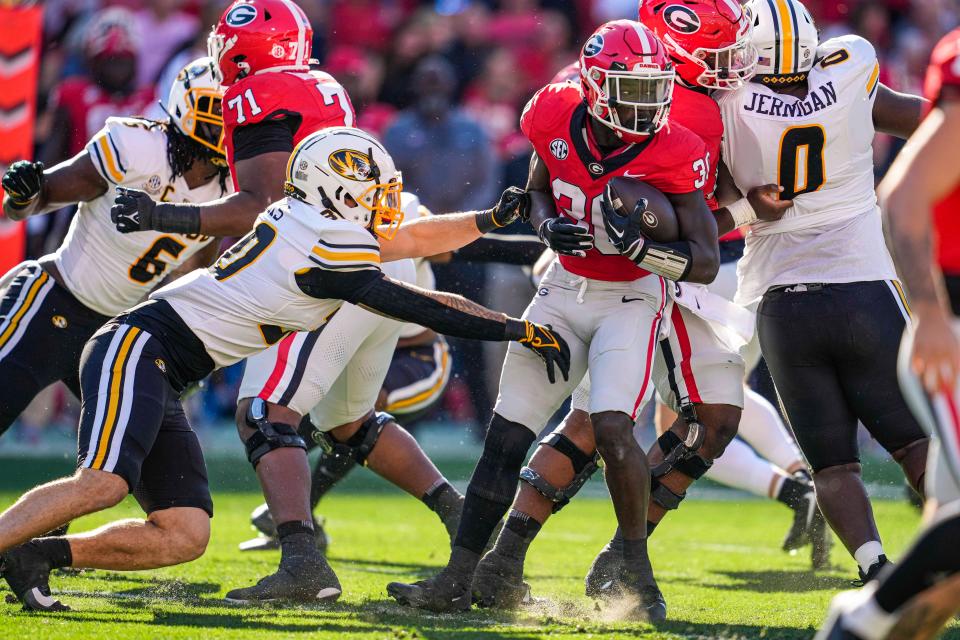What are disconcerting signals? Mizzou football coach Eli Drinkwitz explains the rule
Mizzou football linebacker Ty’Ron Hopper clapped, and the officials threw a flag.
Welcome to college football in 2023, the year of the ‘disconcerting signals.’
Still unsure what those are?
Let Eli Drinkwitz, who addressed the rising enforcement of the rule during his weekly press conference Tuesday, walk you through it.
“Disconcerting signals means that the offensive cadence is protected from the defense, so if your cadence is ‘set, hut’ then in theory the defensive players cannot say hut,” Drinkwitz said. “Well, most people have a clap as their cadence now. So when you are a defensive player and it's loud and you're trying to get the attention — so what happened was we ran the wrong front and (Hopper) is trying to get the attention of the defensive line to shift the front — you can't hear, right? You're yelling, but they can't hear you.
“So what's something that can get their attention?”
Drinkwitz clapped three times.
“Okay, what am I hearing?” he posed. “Why is somebody clapping?”
Drinkwitz clapped three more times.
“I’m clapping, they go on and clap,” he said. “that's a disconcerting signal.”

The Missouri coach said that the Tigers’ coaching staff has talked to the defense to stop clapping and “giving that to the offense,” but added that there aren’t many other ways to communicate in loud environments.
A tap on the helmet, he said, isn’t likely to do the trick, and it’s a test of the vocal cords to out-yell a stadium.
Sanford Stadium frequently hit 115 decibels during MU’s 30-21 road loss to Georgia on Saturday, per the videoboard in the stadium.
Hopper was called for the penalty early in the third quarter of the Tigers’ game in Athens, Georgia, on second and 6 at MU’s 38-yard line. The Tigers were up 13-10. Georgia quarterback Carson Beck clapped, and shortly after Hopper mimicked the move to get his teammate, defensive tackle Kristian Williams, to shift right.
Five-yard penalty.
Hopper sacked Beck on the next play, but pass interference was called on MU cornerback Dreyden Norwood on the subsequent third-and-7 pass to hand UGA a first down.
The Bulldogs found the end zone three plays later, which turned out to be the go-ahead score.

That’s not the first time the penalty has cropped up in an MU loss this year, as the Tigers were called for it twice against LSU in Week 6.
After the LSU defeat, Missouri defensive end Darius Robinson said he hadn’t heard of disconcerting signals. Linebacker Chuck Hicks echoed that Tuesday afternoon.
But the Missouri players are quickly learning.
“Can’t clap,” Hicks said. “There’s not much to it. It’s something you really don’t think about on the field. It is what it is.”
Added Hicks: “I mean, trying to get some attention of one of your guys, whatever it is, you're not thinking you're trying to mess with them. You're just playing ball.”
So how do you counter it, or at the very least stop being penalized for it?
Therein lies the challenge, especially as offenses wise up to the rule.
“You can only protect one (cadence). You can only have one,“ Drinkwitz said. “So let's just say — let's just say — that (the offense gives) a verbal cadence to O-Line to let them know that, ‘hey, we're fixing to clap,’ so that the O-Line’s not just sitting there the whole time, like for 40 seconds with their hands on the ball like, ‘oh my gosh, it's fixing to come.’ So maybe you say something like ‘ready.’ OK, ‘ready.’ Then they know after that the clap can come at any time. But if the other team says ‘ready,’ you can't protect ‘ready’ and the clap.
“So there's some good gamesmanship going on right now.”
This article originally appeared on Columbia Daily Tribune: What are disconcerting signals? Mizzou coach Eli Drinkwitz explains the rule

